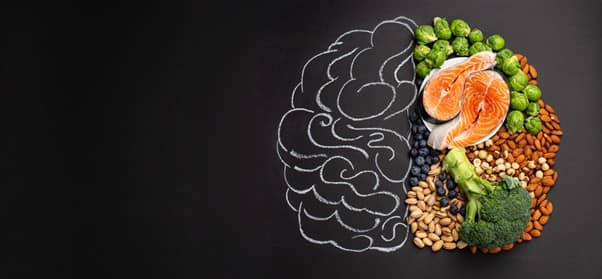Nutrition for Mental Health: Foods that Support OCD Recovery

Overview – The Gut-Brain Connection in OCD
How can I recover my OCD naturally? Proper nutrition plays a crucial role in maintaining mental health and overall well-being. When considering OCD treatment in India, it’s essential to explore various approaches, including non-invasive therapies for OCD. In this article, we will explore the connection between the gut and brain in OCD and discuss the essential nutrients that can support OCD recovery. This article sheds light on the critical role nutrition plays in supporting OCD treatment.
It is now widely recognized that the gut and brain communicate through a complex network of nerves and chemical messengers. In the case of OCD, disruptions in this gut-brain communication can significantly impact mental health. Studies have shown that individuals with OCD often experience imbalances in their gut microbiome, which can result in increased anxiety and obsessive thoughts. Improving the health of the gut can potentially alleviate OCD symptoms.
Essential Nutrients for OCD Recovery
In order to support the recovery from OCD, it is important to focus on consuming specific nutrients that promote brain health and reduce anxiety.
Is Omega-3 Good For OCD? Omega-3 Fatty Acids for Brain Health
- Omega-3 fatty acids, often found in fatty fish like salmon and walnuts, are like brain boosters, contributing to TMS OCD success in Mumbai like other cities.
- These essential fatty acids are part of anti inflammatory diet for OCD which are known to have anti-inflammatory properties and can support a healthy functioning brain.
- They can be found in fatty fish like salmon, mackerel, and sardines, as well as in plant-based sources such as flaxseeds and walnuts.
Antioxidants and Their Role in Reducing Anxiety
Anxiety is a common symptom in individuals with OCD.
- Including foods that help reduce anxiety which are rich in antioxidants in your OCD diet.
- Antioxidants work by neutralizing harmful free radicals in the body, which can contribute to anxiety and other mental health issues.
- Incorporate colourful best fruits for OCD and vegetables like berries, leafy greens, and bell peppers into your meals to ensure a good intake of antioxidants.
How Does Different Micronutrients Impact OCD Symptoms?
Micronutrients, such as vitamins and minerals, are essential for optimal brain function and can have a profound impact on OCD symptoms.
What are the best vitamins for OCD? For example, studies have suggested that low levels of zinc, magnesium, and vitamin B12 may be associated with increased anxiety and OCD symptoms.
Including foods to cure OCD rich in these micronutrients, such as pumpkin seeds for zinc, dark chocolate for magnesium, and fortified cereals for vitamin B12, can provide support for OCD recovery.
Foods to Include in Your Diet for OCD
Incorporating certain foods into your daily diet can have a positive impact on your mental health and support OCD recovery. Consider including the following food groups:
Lean Proteins
Lean proteins, such as turkey, chicken, and tofu, are excellent sources of amino acids, which are the building blocks of neurotransmitters in the brain. These neurotransmitters, such as serotonin and dopamine, play a critical role in regulating mood and reducing anxiety. Including lean proteins in your meals can help stabilize your mood and support mental well-being.
Complex Carbohydrates
Complex carbohydrates, found in whole grains and brown rice, provide the sustained energy needed for recovery from OCD. Complex carbohydrates, like whole grains, sweet potatoes, and quinoa, provide a steady release of glucose, the brain’s primary source of energy. Consuming complex carbohydrates can help maintain stable blood sugar levels and prevent mood swings and irritability, which are often associated with OCD symptoms.
Probiotics and Fermented Foods
A healthy gut microbiome is essential for good mental health. Probiotics, found in fermented foods that can help you manage OCD like yogurt, sauerkraut, and kimchi, can help restore and maintain a healthy balance of gut bacteria. This, in turn, can positively impact brain function and reduce anxiety levels.
What Foods Should You Avoid With OCD?
While incorporating beneficial foods, for individuals exploring non-invasive therapies for OCD as part of their OCD treatment, it’s important to know which foods to avoid or limit. Certain substances that can worsen OCD symptoms:
Caffeine
Caffeine, found in coffee, tea, and energy drinks, is a stimulant that can increase anxiety and exacerbate OCD symptoms. It is advisable to limit or avoid caffeine consumption, especially if you are prone to anxiety or have difficulty controlling your obsessive thoughts.
Sugar
Consuming high amounts of sugar can result in blood sugar fluctuations, leading to mood swings and increased anxiety. Limiting your intake of sugary snacks, sodas, and processed foods can help stabilize your mood and support overall mental health.
Artificial Additives
Artificial additives, such as artificial sweeteners, flavors, and preservatives, have been associated with an increased risk of mental health issues. These substances can disrupt the delicate balance of neurotransmitters in the brain. Opt for whole, natural foods whenever possible to minimize your exposure to artificial additives.
Seeking Professional Guidance
While proper nutrition can be beneficial for OCD recovery, it is important to remember that it is not a substitute for professional treatment. If you’re considering OCD treatment with TMS in Mumbai, consult a hospital specializing in TMS for OCD in Mumbai to ensure a holistic approach to your recovery. They can provide a comprehensive treatment plan tailored to your specific needs.
Maintaining a healthy diet that supports brain function and reduces anxiety is crucial for individuals seeking OCD recovery. By understanding the gut-brain connection in OCD and incorporating essential nutrients into your diet, you can positively impact your mental health. Remember to include lean proteins, complex carbohydrates, probiotics, and foods rich in omega-3 fatty acids and antioxidants. Avoid or limit caffeine, sugar, and artificial additives. Always seek guidance from professionals experienced in OCD treatment with TMS in Mumbai or anywhere in the world to tailor a personalized plan that addresses your unique needs. With the right support and a holistic approach, you can make meaningful progress in managing your OCD symptoms and regaining control over your life.
TMS Treatment Hospital for OCD in Mumbai
The RNR Medicine Department is one of the oldest tertiary care, multi-specialty Trust hospitals in the country. This year is the 50th year of its existence. The RNR Medicine Department at Jaslok Hospital has been the pioneer in the field of neuromodulation and bringing innovative technologies and techniques to the country. In its 50th year, it promises to bring a very futuristic program which is the first of its kind in the country. With a team of more than 20 years of experience in various fields and the latest equipment, Jaslok Hospital has become the best TMS treatment hospital for OCD in Mumbai. The hospital has a team of experts from various fields including psychiatrists, neurologists, neurosurgeons, neurophysiologists, psychologists, etc. They have the clinical experience of more than 20 years so it can be assured that patients receive the best and most genuine advice for their condition.










